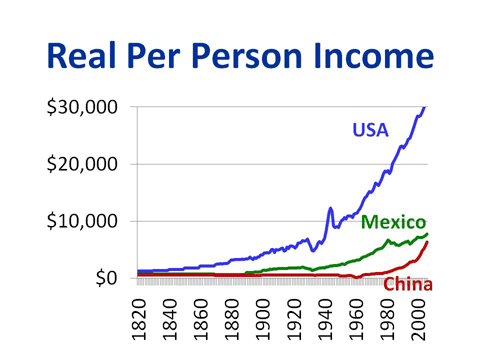After decades where we increasingly bought into the idea that "what's good for Wall Street is good for America," the financial crisis is causing many people to question the nature of business. Is greed and corruption merely "business as usual?" Or can business be a force for good?
In the bubble, a lot of people got rich gambling with other people's money. And when those bets turned sour, the losses were paid for, not by the people who made the bets, but by taxpayers and by millions who lost their jobs. When combined with the cases where big businesses have contributed to ecological devastation, Enron-style fraud, and childhood obesity, there's a lot of anger about the way business is being done.
But here's the thing. Capitalism is far and away the most powerful system ever developed for creating wealth and raising our standard of living. Over the last 190 years, the real per person income level in the US has increased from $1,200 to $31,000. Our level of wealth has increased so much that we now drive to our protests. 
Capitalism creates wealth - enormous wealth - and this wealth pays for our homes, education, health care, social services, and the many non-profits we donate to.
The problem isn't that business is bad. In its own way, business is already a tremendous force for good.
The problem is that most of this good is being done unconsciously. It's being done almost by accident, rather than as part of a consciously defined purpose. Relentless, ruthless competition creates profits - lots of profits - but these profits come with a price.
As its most commonly practiced, traditional business has three core problems.
It's short on purpose.
It's long on fear.
And it's unsustainable.
Purpose. A colleague of mine does a lot of work with boards of directors. These men have risen to the top of their competitive ladders. And yet their biggest question is usually, "is this all there is?" They've often sacrificed everything to their careers, only to find a sense of emptiness and a lack of fulfillment.
The reason for this is that traditionally, we've compartmentalized money and meaning. For-profits are supposed to make money. Non-profits are supposed to make a difference. And that has left many people in business feeling successful but unfulfilled.
Fear. At its core, traditional business is fueled by scarcity and stress - two polite names for fear. Why do people get corrupt and greedy? Because they're afraid there's not enough to go around. In daily life, we don't get greedy for air. We don't try to hoard it, or store it away, because we trust that there's enough for everyone. But capitalism is based on relentless, ruthless competition over scarce goods and services - and that creates fear. Feeling stressed about work isn't something special. It's an automatic consequence of being part of this system.
Sustainability. Capitalism's greatest strength is its unparalleled capacity for economic expansion. And capitalism's greatest challenge is its addiction to that expansion. Our entire financial system is predicated on the assumption that GDP will always keep increasing. Stock markets, debt and retirement funds all depend on this. So does our monetary supply. But continuous exponential expansion is unsustainable, and we're rapidly reaching its limits.
Capitalism is a system with tremendous strengths - and with equally tremendous challenges.
So the real question is not "can business be a force for good?" The real question is "how can business be more of a force for good?" How can it provide more purpose, less fear, and more sustainability? And how can it do this more consciously, rather than as something we try to just fit in the cracks?
Now, those are some questions worth investing in.
To learn more about this topic, please feel free to visit www.consciousbusinessnow.com or www.corecoaching.org.